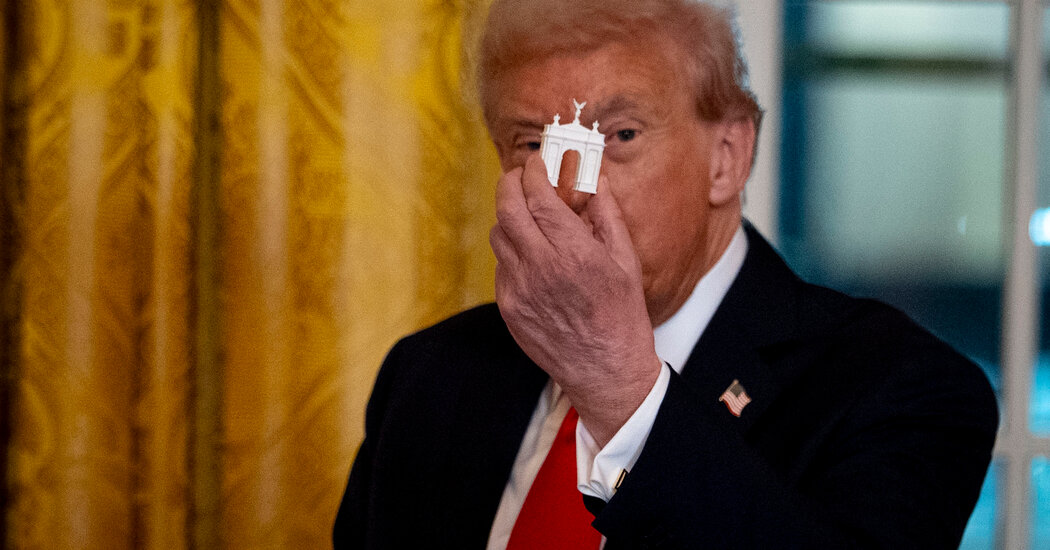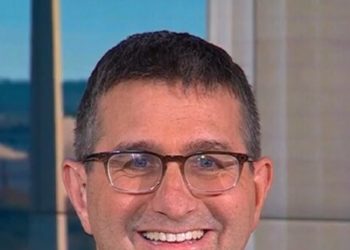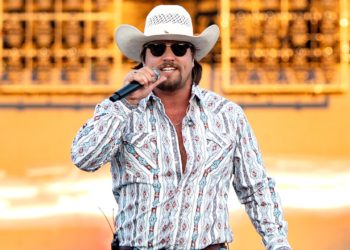A few weeks ago, President Trump momentarily dropped the bombast and the playground insults and the self-congratulation to muse about his eternal soul. “I want to try and get to heaven, if possible,” he said. “I’m hearing I’m not doing well. I am really at the bottom of the totem pole.”
Prodded by a reporter this month to elaborate, he repeated the lament without much more explanation. “I’m being a little cute,” he said. But he went on: “I don’t think there’s anything that’s going to get me into heaven. I think I’m not maybe heaven-bound.”
Mr. Trump is hardly the first 79-year-old to dwell on what may come after he departs this mortal coil — or to wonder whether he has earned entry into the pearly gates. But it is so unlike Mr. Trump to express self-doubt that his public rumination has raised questions. What is on his mind lately that makes him fear his fate in the hereafter? What sins might he be regretting?
He has not clarified his thinking, at least not on camera, nor for that matter has he shown any public signs of repentance for scandals that he may believe hold him back from grace. And yet the president’s curious contemplation comes at a time when Mr. Trump seems to be seeking a form of immortality. If absolution is out of reach, perhaps there are more achievable ways of living beyond his natural time on this earth.
And so, the man who over a long career in business slapped his name on buildings around the world now seems intent on leaving his mark in even more grandiose fashion. He demolished the East Wing of the White House last week to make way for a vast, gilded Trumpian ballroom. He wants to erect an arch at the entrance to Washington that resembles Napoleon’s Arc de Triomphe. He is even considering having the government issue a new $1 coin with his own face on it, something no president has done in nearly a century.
His allies have gotten into the game, too. Republican members of Congress have introduced bills to rename the John F. Kennedy Center for the Performing Arts or Washington Dulles International Airport after Mr. Trump. Another measure submitted in the House would add Mr. Trump’s visage to Mount Rushmore alongside those of George Washington, Thomas Jefferson, Abraham Lincoln and Theodore Roosevelt, an ambition that Mr. Trump expressed in his first term.
Presumably none of that would provide a speed pass to paradise, but it might help satisfy Mr. Trump’s craving for glory that will outlast his time in office. As it is, his on-again, off-again flirtation with the idea of running for an unconstitutional third term makes clear his reluctance to cede the stage. All presidents want to leave a legacy once they do depart, historical and often physical — see Barack Obama’s new towering presidential library rising in Chicago, called the “Obamalisk.”
But none in modern times have gone to the lengths that Mr. Trump has to put his personal stamp on national landmarks. And the two times he talked about heaven recently came in the context of the cease-fire that he brokered in Gaza and his efforts to negotiate peace in Ukraine, in effect offering those as his argument for salvation.
“Trump is trying to figure out The Art of the Heavenly Deal,” said Peter H. Wehner, a former White House adviser to President George W. Bush who has written extensively on religion and politics. “Trump is hoping he can convince God that he deserves a place in the Holy of Holies. God, not Trump, will be the ultimate judge of that. That’s true for Trump, and it’s true for all of us.”
The challenge for the president, Mr. Wehner added, is that his usual methods for getting his way are not particularly suited to Judgment Day. “Trump can’t weaponize the federal government against God,” Mr. Wehner said. “He can’t force God to sign an N.D.A. He can’t cut off federal funding to God” or “intimidate God into silence, or threaten God with a primary challenge, or threaten God with a lawsuit.”
Aides have not explained Mr. Trump’s thinking but said he was building a record as president to be proud of. “President Trump’s legacy will be remembered across the world for all of history as the peace president,” Taylor Rogers, a White House spokeswoman, said in response to questions.
“President Trump,” she added, “has brought hostages home, ended numerous wars, stopped human trafficking and drug smuggling across our border” and created a faith office in the White House and a religious liberty commission.
He has also done things — by his own admission or the findings of courts — that would violate at least some of the Ten Commandments, including adultery, lying, taking the Lord’s name in vain and, if one counts business fraud, stealing. Nor is he a stranger to most of the seven deadly sins: pride, greed, wrath, envy, lust, gluttony and sloth. His critics point to a civil verdict of sexual abuse, a criminal conviction stemming from covering up hush money payments to a porn star, his self-enrichment in office and his degrading treatment of God’s other children, including immigrants.
Mr. Trump’s musings about the afterlife come at a time when he has been testing the thou-shalt-not-kill commandment by ordering deadly strikes without due process or substantive legal justification against alleged drug smugglers posing no imminent threat. Nearly every modern president, of course, has authorized deadly force at some point, although many legal experts contend that killing civilians, even criminals, without trial stretches if not breaks the bounds of law. Mr. Trump argues that the suspected drug runners are the equivalent of enemy soldiers in wartime.
It might not be surprising for a man nearing the end of his eighth decade to be taking stock. But it is surprising for Mr. Trump, who rarely engages in the kind of public introspection that would entertain doubt about his worthiness for heaven.
“Trump’s statement is surprising, if not shocking, given the hubris he often displays and his desire to be thought of highly by Christians, especially evangelicals,” said Gary Scott Smith, a professor emeritus of history at Grove City College and the author of books on presidents and religion. “While other presidents may have ruminated about this issue privately, I am not aware of any of them making a public statement questioning whether they will go to heaven.”
Mr. Trump rarely goes to church, rarely quotes Scripture, rarely cites religion as a force in his life. Yet he has become a favorite of many religious conservatives, who see him as a vessel for achieving important goals, notably the appointment of Supreme Court justices who voted to overturn Roe v. Wade.
He has increasingly cast himself as a figure saved for a purpose by God from two assassination attempts last year, including one in Butler, Pa., where a bullet came perhaps an inch or so from ending his life. In speeches and fund-raising appeals, Mr. Trump has framed his second term as a divinely inspired mission. Now he is sending fund-raising appeals quoting his line about wanting to get into heaven.
Some of Mr. Trump’s religious supporters see the president’s recent musings as evidence that he is wrestling with the same existential questions that confront many people, particularly late in life.
“I think it’s admirable that the president of the United States is thinking about where he will spend eternity — every American should care about that,” said Robert Jeffress, the Dallas evangelical pastor who has spent time with Mr. Trump at the White House. “Furthermore, when he indicates doubt that he may be going there, I believe that he is demonstrating a humility we should all have about our unworthiness.”
Mr. Jeffress said he is convinced that the president is a religious man. “I know that he has heard the gospel message since he was a boy listening to Billy Graham that our salvation comes through faith in Jesus Christ and not by our works,” Mr. Jeffress said.
Christopher Ruddy, the chief executive of Newsmax Media and a friend of Mr. Trump’s, traces the president’s faith to his upbringing, which was heavily influenced by Norman Vincent Peale, the religious figure known for “The Power of Positive Thinking,” a popular best seller.
“Peale was the ultimate prosperity gospel Calvinist,” Mr. Ruddy said. “Trump himself reflects that worldview to an amazing degree. Peale was very much focused on success in this life. No surprise to me that Donald Trump doesn’t spend much time thinking about the next.”
As Mr. Jeffress alluded to, many religious figures have suggested that Mr. Trump’s latest talk misses the point. His framing of the question belies the belief of many Christians that entry into heaven depends primarily on a profession of faith in Christ as their Lord and Savior, not on a simple scorecard of good deeds versus bad deeds.
But Mr. Trump is a transactional man. His son Eric Trump told the podcaster Benny Johnson that the president may be “too humble to say” that he is going to heaven, but his work to end wars will get him there. “He stopped the death and destruction around the world,” Eric Trump said. “I’ve personally witnessed him stop wars.” He added, “And that in itself will get my father into heaven.”
Whatever his eventual destination, Mr. Trump lately has moved to make sure he is not forgotten in Washington after he is gone. The new 90,000-square-foot ballroom that he wants to add to the White House — nearly twice as large as the mansion itself — is just the latest change he made after paving over the Rose Garden lawn and adding gold trim throughout the Oval Office and Cabinet Room.
After ABC News reported that officials were already calling the planned addition the “President Donald J. Trump Presidential Ballroom,” the president dismissed that as “fake news.” He added, “I don’t have any plan to call it after myself.”
But it’s hard to imagine his objecting if everyone else calls it that.
Peter Baker is the chief White House correspondent for The Times. He is covering his sixth presidency and sometimes writes analytical pieces that place presidents and their administrations in a larger context and historical framework.
The post Trump’s Search for Eternity: Heaven? Maybe Not, He Says. Monuments? Absolutely. appeared first on New York Times.




